Registrations open for the first pan-Canadian Model European Union!

Join the Canadian Model European Union 2023 Conference!
Registrations open from December 22nd 2022 until February 13th 2023
European Council
The European Union’s Arctic Policy
- DURATION: 3 DAYS
- LOCATION: CARLETON UNIVERSITY, OTTAWA
- START: MAY 5TH 2023
- END: MAY 7TH 2023
- LANGUAGE: ENGLISH
- COST: FREE
- MODEL EU Format: EUROPEAN COUNCIL
- TOPIC: THE EUROPEAN UNION’S ARCTIC POLICY
What will this Model EU simulate?
This Model EU will simulate a meeting of the European Council. The European Council is the institution that shapes the general agenda and priorities of the European Union. It is comprised of the 27 heads of states or government of the EU Member States as well as the President of the European Council and the President of the European Commission. As such, the European Council is the forum for cooperation among Member States at the highest level. It typically meets four times a year in Brussels, and its decisions are, for the most part, reached through consensus. In this simulation, teams will represent heads of state or government of the EU Member States, such as the President of France or the Prime Minister of Denmark.
This year’s topic: the European Union’s Arctic policy
The importance of the Arctic region has significantly increased over the past decade and the Arctic has become the focus of global attention; beyond the eight Arctic states (Canada, Denmark, Finland, Iceland, Norway, the Russian Federation, Sweden, and the United States) other countries (e.g.: China) have shown interest in the region and have drafted national policies and strategies regarding it. The EU, as a global actor, has not remained indifferent to these developments. European interests are linked with the future of the Arctic, due to historical, geographical, and economical links. Consistently, the EU has encouraged international cooperation for the protection of the Arctic and its people, while strongly advocating the need to preserve its environment, which is undergoing changes at a pace outstripping the rest of the world. During this simulation, teams – representing EU countries’ leaders – will have to reach an agreement on the main pillars of the EU’s Arctic Policy, determining the EU’s approach to this area of the globe for the coming decade and beyond.
Who can participate?
- University professors from Canadian universities can apply to Model EU and invite their students to participate. Students must be in teams of two. University professors applying will become a contact point between the organizers and the student teams.
- University students cannot directly apply to Model EU but are strongly encouraged to ask a professor from their university to submit the application on their behalf.
- All participants students must be registered at a Canadian university during the 2022-2023 academic year
Why should you participate?
- Participating in the Canadian Model EU will help you learn more about the European Union's decision-making process and challenge you in multiple other ways. It will help you develop new skillsets, such as public speaking, negotiation or working as a team and under pressure.
- Each participating university will receive a grant varying from 750 euros to 1,000 euros for each team of two students registered to Model EU. This grant should be used within the 2023-2024 academic year, and it must support an EU-focused activity (such as sponsoring students for enrolling in the EUSTIP or other similar programmes, organising EU-related events on your campus, supporting participation to other MEU conferences etc.).
- Travel, accommodation, and meals will be offered to all participating students and Coordinator Professors attending the Model EU simulation in Ottawa, in May 2023.
- All participating students will receive a Certificate of Participation from the Delegation of the European Union to Canada.
HOW TO REGISTER
- All applications must be submitted by a university professor (contact point / Coordinator Professor)
- Each university will have to include the following in their applications: A list with the student names for up to 5 proposed teams of two students with each team ranking the top three EU Member States they would like to represent (the rankings need to include at least one Eastern European Member State in this top three list).
Note: please be aware that it is not guaranteed that all 5 teams from your university will be accepted, as we are trying to offer this opportunity to as many universities as possible You will be notified within a couple of weeks after the application deadline has passed of the number of teams that your university can send to the conference.
- CV of the university contact person/ Coordinator Professor
Please send your applications and inquiries to: delegation-canada-pol@eeas.europa.eu by February 13th, 2023.
PRACTICAL INFORMATION
- Students will explore and apply negotiation tactics and strategies, learning how to act as leaders of European Union member-states
- Students will gain in-depth knowledge of EU policy-making in an active and experiential manner, through an immersive Model EU Simulation, which will take place in Ottawa from May 5th to 7th, 2023.
- Model EU format: European Council
- The topic for the debate: "The European Union’s Arctic Policy". Further information and additional resources will be shared with the participants prior to the event.
- Participants will take part in preparatory webinar courses, held online.
- Further details regarding the Model EU agenda, opening ceremony event, and other logistical and organization matters will be communicated in due time.
- Travel, accommodation, and meals will be offered to all participating students and Coordinator Professors to attend the simulation in Ottawa.
- An Opening Ceremony Reception will be held offering an opportunity for students to network with key actors such as EU Embassies and EU Delegation officials.
- Other side events/roundtable debates for the participating Coordinator Professors may be organized, pending availability, interest, and resources.
